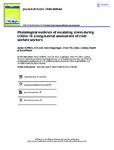Physiological evidence of escalating stress during COVID-19: a longitudinal assessment of child welfare workers
| dc.contributor.author | Griffiths, Austin | |
| dc.contributor.author | Link, Kimberly | |
| dc.contributor.author | Haughtigan, Kara | |
| dc.contributor.author | Beer, Oliver | |
| dc.contributor.author | Powell, Lindsey | |
| dc.contributor.author | Royse, David | |
| dc.date.accessioned | 2023-02-23T12:44:58Z | |
| dc.date.available | 2023-02-23T12:44:58Z | |
| dc.date.issued | 2023-02-24 | |
| dc.identifier.issn | 1554-8732 | |
| dc.identifier.issn | 1554-8740 | |
| dc.identifier.uri | http://hdl.handle.net/10026.1/20491 | |
| dc.description.abstract |
Studies have shown that stress has contributed to employee turnover and retention problems for agencies, and at the individual level, chronic stress has been associated with coronary heart disease, anxiety, depression, and many other negative effects. In the past, the extent of stress one has felt has been measured by subjective paper-and-pencil instruments; however, recent technological advances have improved our ability to obtain accurate biofeedback assessments from wearable instruments. The Kentucky Child Welfare Workforce Wellness Initiative is the first known study to explore physiological stress in a sample (n = 32) of child welfare professionals using biometric technology (Firstbeat Bodyguard 2) and the first to report that data longitudinally over a four-month period. The study revealed that a variable associated with the strength of the Autonomic Nervous System (RMSSD) remained below the norms for a healthy population as participants experienced consistent and prolonged physiological stress. When examined relatively to the agency’s lifting of COVID restrictions and returning to face-to-face service delivery, stress levels began to further rise almost to significant levels (p < .10) and the participants’ ability to achieve a state of physiological relaxation significantly decreased. Future research employing biometric technology is also suggested. | |
| dc.format.extent | 1-24 | |
| dc.language | en | |
| dc.language.iso | en | |
| dc.publisher | Informa UK Limited | |
| dc.subject | Child welfare | |
| dc.subject | longitudinal | |
| dc.subject | health | |
| dc.subject | biomarkers | |
| dc.subject | job stress | |
| dc.title | Physiological evidence of escalating stress during COVID-19: a longitudinal assessment of child welfare workers | |
| dc.type | journal-article | |
| dc.type | Journal Article | |
| plymouth.author-url | https://www.webofscience.com/api/gateway?GWVersion=2&SrcApp=PARTNER_APP&SrcAuth=LinksAMR&KeyUT=WOS:000936269000001&DestLinkType=FullRecord&DestApp=ALL_WOS&UsrCustomerID=11bb513d99f797142bcfeffcc58ea008 | |
| plymouth.issue | ahead-of-print | |
| plymouth.volume | ahead-of-print | |
| plymouth.publication-status | Published online | |
| plymouth.journal | Journal of Public Child Welfare | |
| dc.identifier.doi | 10.1080/15548732.2023.2182396 | |
| plymouth.organisational-group | /Plymouth | |
| plymouth.organisational-group | /Plymouth/Faculty of Health | |
| plymouth.organisational-group | /Plymouth/Faculty of Health/School of Health Professions | |
| plymouth.organisational-group | /Plymouth/Users by role | |
| plymouth.organisational-group | /Plymouth/Users by role/Academics | |
| dc.identifier.eissn | 1554-8740 | |
| dc.rights.embargoperiod | Not known | |
| rioxxterms.versionofrecord | 10.1080/15548732.2023.2182396 | |
| rioxxterms.licenseref.uri | http://www.rioxx.net/licenses/all-rights-reserved | |
| rioxxterms.type | Journal Article/Review |


